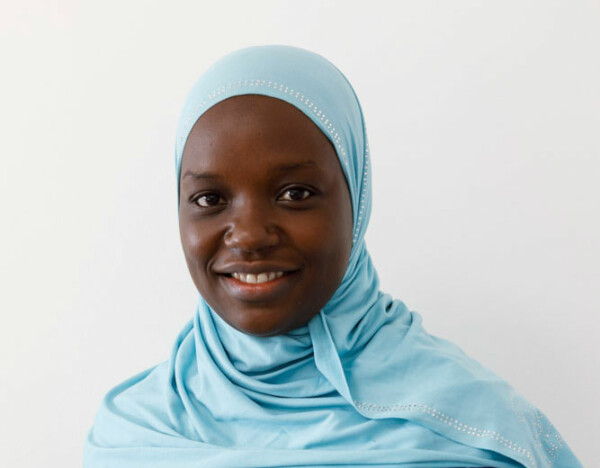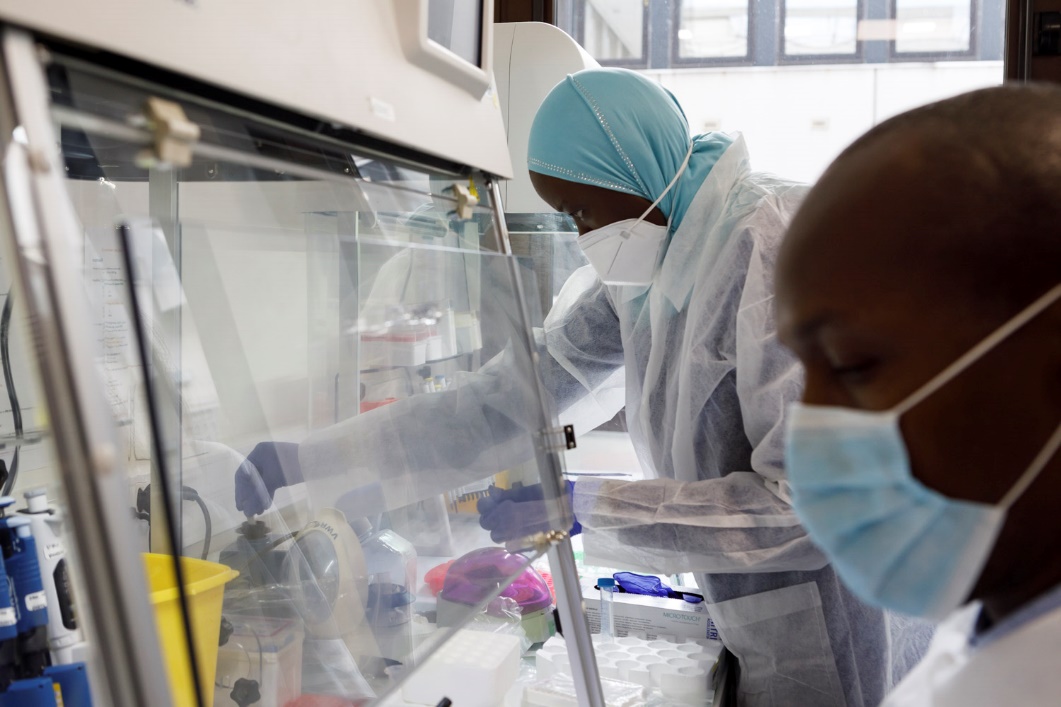Sequencing training: meeting with Fatoumata Diallo
Sequencing training: meeting with Fatoumata Diallo
For three weeks, six scientists from Senegal, Mali and Burkina Faso were hosted by ANRS | Maladies infectieuses émergentes for training in the genomic platform of the Henri Mondor University Hospital (AP-HP).
We met with one of them, Fatoumata Diallo, a biologist at the Bacteriology-Virology laboratory of the Centre Hospitalier National Universitaire de Fann, in Dakar (Senegal).

How is the surveillance of variants conducted in Senegal?
For the moment, only two laboratories are actively involved in the surveillance of variants in Senegal, the Institut Pasteur de Dakar (IPD) and IRESSEF (Institut de Recherche en Santé et de Surveillance Epidémiologique).
These laboratories receive samples from patients hospitalized in the country’s various CTEs (Epidemic Treatment Centers) and/or from people traveling to Senegal. Once the COVID diagnosis is confirmed, sampling is performed according to pre-established criteria to select the strains to be sequenced. The sequencing results are then transmitted to the Ministry of Health.
It should be noted that to date, no public system laboratory is involved in this surveillance of variants, which is somewhat of an anomaly. By equipping the laboratory of the CHNU of Fann, the AFROSCREEN project will allow to remedy this.
What is the role of the laboratory of Bacteriology-Virology of the CHNU of Fann in this surveillance?
The Bacteriology-Virology laboratory of FANN has a triple mission: diagnosis, training and epidemiological surveillance.
It is located in one of the largest hospitals in Senegal, the FANN hospital, which is a level 3 hospital that has an infectious diseases department, the largest in the country, and a pneumology department.
Since the implementation of the APHRO-CoV project during the Covid epidemic, the laboratory has been authorized to perform COVID tests by RT-PCR. Thus, the results of the tests that have been performed there for a year now are transmitted daily to the Ministry of Health, which integrates them in its daily communication.

What was the purpose of this training and what did you gain from it?
The purpose of this training was to strengthen our capacities in the detection and analysis of SARS-CoV-2 mutations. This involves strengthening our skills in sequencing but also in bioinformatics analysis of sequences.
A restitution will be made upon our return to the rest of the laboratory staff, in order to share the acquired knowledge, which will reinforce in a global way the capacities of the Fann laboratory in the surveillance of SARS-CoV-2 variants.
We appreciate the warm welcome we received when we arrived in Paris, the integration but also the interesting exchanges we had with the staff of the virology unit of the CHU Henri Mondor (AP-HP), especially on how to organize ourselves once back home. We hope that this project will lead to collaboration between the countries involved, such as Burkina Faso and Mali, but also with the CHU Henri Mondor for a better surveillance of SARS-CoV-2 variants in Africa.
How does the AFROSCREEN project fit into the sequencing strategy in Senegal?
This project is very well received in Senegal and more particularly at the CHNU of Fann where the main infectious diseases department of the country is located. It is a continuity of the Aphro-CoV project, which equipped the FANN laboratory to diagnose COVID-19.
Today, the AFROSCREEN project will allow for better surveillance of variants in the country. As the Fann laboratory is already one of the laboratories involved in the diagnosis of COVID-19 in Senegal, the sequencing data for the detection of SARS-CoV-2 variants will complement the data that are already transmitted daily to the Ministry of Health.
The reception, follow-up and support of Dr. Diallo and his Burkinabe, Malian and Senegalese colleagues throughout the training provided by the genomic platform of the Henri Mondor University Hospital were ensured by Science Accueil, a partner of ANRS | Maladies infectieuses émergentes.
Find out more:
Sequencing training organized in February 2022
How is the surveillance of variants conducted in Senegal?
For the moment, only two laboratories are actively involved in the surveillance of variants in Senegal, the Institut Pasteur de Dakar (IPD) and IRESSEF (Institut de Recherche en Santé et de Surveillance Epidémiologique).
These laboratories receive samples from patients hospitalized in the country’s various CTEs (Epidemic Treatment Centers) and/or from people traveling to Senegal. Once the COVID diagnosis is confirmed, sampling is performed according to pre-established criteria to select the strains to be sequenced. The sequencing results are then transmitted to the Ministry of Health.
It should be noted that to date, no public system laboratory is involved in this surveillance of variants, which is somewhat of an anomaly. By equipping the laboratory of the CHNU of Fann, the AFROSCREEN project will allow to remedy this.
What is the role of the laboratory of Bacteriology-Virology of the CHNU of Fann in this surveillance?
The Bacteriology-Virology laboratory of FANN has a triple mission: diagnosis, training and epidemiological surveillance.
It is located in one of the largest hospitals in Senegal, the FANN hospital, which is a level 3 hospital that has an infectious diseases department, the largest in the country, and a pneumology department.
Since the implementation of the APHRO-CoV project during the Covid epidemic, the laboratory has been authorized to perform COVID tests by RT-PCR. Thus, the results of the tests that have been performed there for a year now are transmitted daily to the Ministry of Health, which integrates them in its daily communication.

What was the purpose of this training and what did you gain from it?
The purpose of this training was to strengthen our capacities in the detection and analysis of SARS-CoV-2 mutations. This involves strengthening our skills in sequencing but also in bioinformatics analysis of sequences.
A restitution will be made upon our return to the rest of the laboratory staff, in order to share the acquired knowledge, which will reinforce in a global way the capacities of the Fann laboratory in the surveillance of SARS-CoV-2 variants.
We appreciate the warm welcome we received when we arrived in Paris, the integration but also the interesting exchanges we had with the staff of the virology unit of the CHU Henri Mondor (AP-HP), especially on how to organize ourselves once back home. We hope that this project will lead to collaboration between the countries involved, such as Burkina Faso and Mali, but also with the CHU Henri Mondor for a better surveillance of SARS-CoV-2 variants in Africa.
How does the AFROSCREEN project fit into the sequencing strategy in Senegal?
This project is very well received in Senegal and more particularly at the CHNU of Fann where the main infectious diseases department of the country is located. It is a continuity of the Aphro-CoV project, which equipped the FANN laboratory to diagnose COVID-19.
Today, the AFROSCREEN project will allow for better surveillance of variants in the country. As the Fann laboratory is already one of the laboratories involved in the diagnosis of COVID-19 in Senegal, the sequencing data for the detection of SARS-CoV-2 variants will complement the data that are already transmitted daily to the Ministry of Health.
The reception, follow-up and support of Dr. Diallo and his Burkinabe, Malian and Senegalese colleagues throughout the training provided by the genomic platform of the Henri Mondor University Hospital were ensured by Science Accueil, a partner of ANRS | Maladies infectieuses émergentes.
Find out more:
Sequencing training organized in February 2022